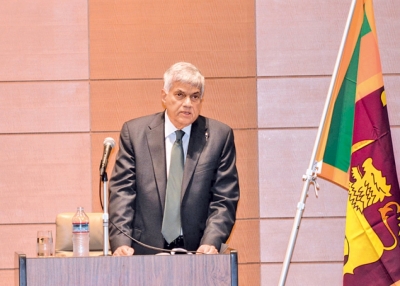China did not join talks launched in early May by creditors including Japan, France and India, raising concerns about the outcome
Tokyo, May 27 (Nikkei Asia): Sri Lankan President Ranil Wickremesinghe said here on Thursday, that there can be “no exceptions” to ongoing talks on reducing the country’s debt, suggesting that China, its largest creditor, needs to be part of the multilateral framework.
China did not join talks launched in early May by creditors including Japan, France and India, raising concerns about the outcome.
“We wanted China to be on the common platform but China said no, that they prefer to be separate,” Wickremesinghe said in an interview on the sidelines of Nikkei’s annual Future of Asia forum.
He dismissed the notion that China may be seeking a separate deal that is more beneficial to Beijing. “We will not have separate deals,” he said. “We won’t give advantage to one party, we will work on the same principles.”
The small island country in South Asia carries $80.7 billion in public debt, with bilateral loans accounting for around $11.1 billion. China is the biggest lender, holding 40% of that total, but it remained an observer in the May talks.
Sri Lanka became the first middle-income nation to essentially fall into default in May last year after failing to repay infrastructure funds extended by China and other countries. Interest rate hikes in the United States and other wealthier nations have stoked Sri Lanka’s troubles, ramping up the burden of servicing debt.
Wickremesinghe said he was confident the talks would conclude in September for both domestic and external debt, as the nation promised earlier. “We like to reduce some and we like to prolong [some of the debt] also,” he added.
Inflation is another burden on Sri Lanka, with the national consumer price index jumping 49.2% on the year in March. “The central bank [of Sri Lanka,] has assured me that inflation will come down to single-digit numbers by the end of this year,” said Wickremesinghe, stressing that he is confident about meeting that target.
Turning to internal politics, he touched on a controversial anti-terrorism draft bill that has sparked some criticism after it was revealed to the public amid fears it could be used to crack down on protests.
“The vast majority [of the population] want this law,” Wickremesinghe said, emphasizing that the bill would have prevented some of the reported cases of torture as it will allow magistrates access to suspects in detention. “A lot of prisoners that have been [held] under [a current terrorism law], we are releasing, and we only have a handful now.”





